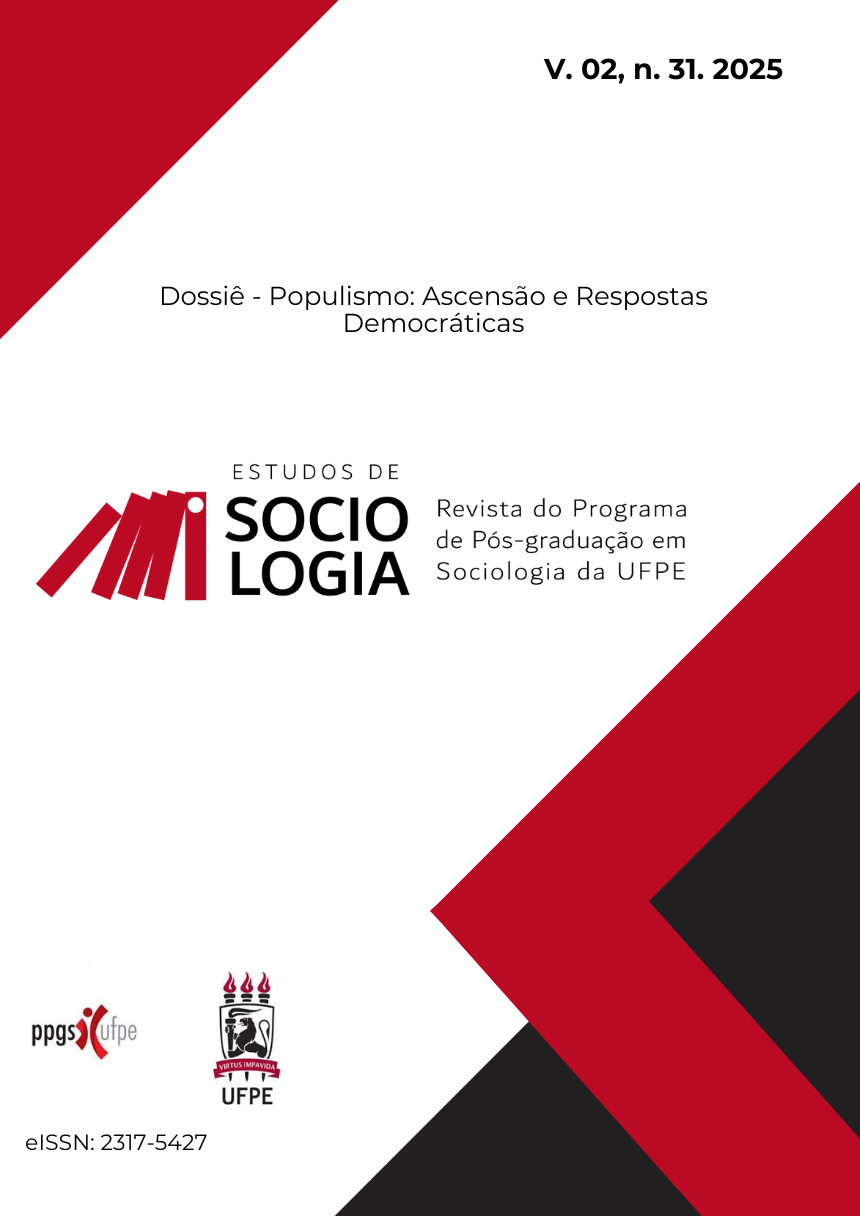What is talked about when talking about digital populism?
DOI:
https://doi.org/10.51359/2317-5427.2025.266245Keywords:
democracy, fake news, digital populism, worldviewAbstract
The relationship between digital populism and fake news will be analyzed, showing how this relationship impacts contemporary democracy. Highlighting that current politics is marked by a dispute over conceptions of truth, two main approaches to the subject are explored: (1) the epistemological, which examines fake news as false information intended to deceive, and (2) the political, which highlights its use by populist leaders to mobilize followers and destabilize democratic institutions. Recognizing the limitations of the first approach, which fails to explain the social acceptance of fake news, it is possible to argue in favor of the second perspective, which incorporates moral and political dimensions. In this sense, digital populism is characterized by the convergence of digital technologies and fake news with populist strategies that create information bubbles and appeal to collective emotions. It is therefore possible to see that digital populism represents a threat to democracy by promoting a worldview that is antagonistic to democratic normativity, requiring new forms of regulation and resistance.
References
ADORNO, Theodor. Aspectos do Novo Radicalismo de Direita. São Paulo: Unesp, 2020.
ARENDT, Hannah. Entre o Passado e o Futuro. 5 ed. São Paulo: Perspectiva, 2000.
BERLIN, Isaiah et al. To Define Populism. In: Government and Opposition, v. 3, n. 2, p. 137-179, 1968.
BOBBIO, Norberto. O Futuro da Democracia. São Paulo: Paz & Terra, 2020.
BRUZZONE, Andrés. Ciberpopulismo. São Paulo: Contexto, 2021.
CESARINO, Letícia. Populismo Digital. In: SZWAKO, José; RATTON, José Luiz. Dicionário dos negacionismos no Brasil., p.265-267, Recife: Cepe Editora, 2022a.
CESARINO, Letícia. O Mundo do Avesso: verdade e política na era digital. São Paulo: Ubu, 2022b.
CHALHOUB, J. Fascismo. In: SZWAKO, José; RATTON, José Luiz. Dicionário dos negacionismos no Brasil. , p. 140-142, Recife: Cepe Editora, 2022.
COADY, David. The Fake News about Fake News. In: BERNECKER, Sven; FLOWERREE, Amy; GRUNDMANN, Thomas. The Epistemology of Fake News. Oxford: Oxford University Press, 2021, p. 58 - 81.
COLIVA, Annalisa. Extended Rationality: a hinge epistemology. Nova York: Palgrave Macmillan, 2015.
DE MORAES, Alexandre. Democracia e Redes Sociais: desafio de combater o populismo digital extremista. São Paulo: Atlas, 2024.
DO AMARAL, Augusto Jobim; DA SILVEIRA, Felipe Lazzari. Bolsonarismo e o fascismo na Era Digital. Revista Brasileira de Estudos Políticos, v. 127, n. 2, 2023.
FAUSTO, R. O Ciclo do Totalitarismo. São Paulo: Editora Perspectiva, 2019.
FINCHELSTEIN, Federico. Do Fascimo ao Populismo na História. São Paulo: Almedina, 2019.
GELFERT, Axel. A Critical Introduction to Testimony. Londres: Bloomsbury Academic, 2014.
GLOCK, Hans-Johann. Dicionário Wittgenstein. Rio de Janeiro: Zahar, 1998.
HARDWIG, John. Epistemic Dependence. In: The Journal of Philosophy, v. 82, n. 7, p. 335-349, 1985.
HOBBES, Thomas. Leviatã. Rio de Janeiro: Vozes, 2020.
JASTER, Romy; LANIUS, David. Speaking of Fake News. In: BERNECKER, Sven; FLOWERREE, Amy; GRUNDMANN, Thomas. The Epistemology of Fake News. Oxford: Oxford University Press, 2021, p. 19 - 45.
JOURDAN, Camila Rodrigues. Desacordos Profundos na Guerra das Formas de Vida. In: O que nos faz pensar, v. 29, n. 49, p. 57-77, 2021.
LACLAU, Ernesto; MOUFFE, Chantal. Hegemonia e Estratégia Socialista. São Paulo: Intermeios, 2015.
LATOUR, Bruno. Bruno Latour, The Post-Truth Philosopher, Mounts a Defense of Science. [Entrevista concedida a] Ava Kofman. In: The New York Times, Nova York, 25 out. 2018.
LESSA, Renato. Homo Bolsonarus. In: Revista Serrote, número especial, p. 46-67, 2020.
LESSA, Renato. Da Destruição Como Paradigma. In: Lua Nova, n. 122, p. 1-38, 2024.
MACHADO, Alexandre Noronha. Lógica e Forma de Vida: Wittgenstein e a natureza da necessidade lógica e da filosofia. São Leopoldo: Editora Unisinos, 2007.
MOUFFE, Chantal. Por um Populismo de Esquerda. São Paulo: Autonomia Literária, 2019.
MOUFFE, Chantal. The Democratic Paradox. Nova York: Verso, 2000.
MUDDE, Cas. O Zeitgeist Populista. In: Exilium, v. 2, n. 3, p. 263-298, 2021.
MÜLLER, Felipe de Matos; ETCHEVERRY, Kátia Martins (orgs.). Ensaios Sobre Epistemologia do Testemunho. Porto Alegre: Rio Grande do Sul, 2017.
NORRIS, P. Varieties of Populist Parties. In: Philosophy and Social Criticism, v. 45, p. 981-1012, 2019.
PAXTON. Roberto. A Anatomia do Fascismo. 2° ed. Rio de Janeiro: Paz & Terra, 2023.
PAVÃO, Nara, PEREIRA, Frederico B., BUENO, Natália S. NUNES, Felipe. Fake News, Fact Checking, and Partisanship: The resilience of rumors in the 2018 Brazilian Elections. In: The Journal of Politics, v. 84, n. 4, p. 2188-2201, 2022.
PITKIN, Hannah. Wittgenstein e a Justiça. São Paulo: Loyola, 2023.
PRADO, Magaly. Fake News e Inteligência Artificial: o poder dos algoritmos na guerra da desinformação. São Paulo: Edições 70, 2022.
ROCHA, João Cezar de Castro. Bolsonarismo: da guerra cultural ao terrorismo doméstico – retórica do ódio e dissonância cognitiva coletiva. Belo Horizonte: Autêntica, 2023.
RODRIGUES, C. Máquina do Tempo: Passado, presente e futuro do Fascismo. In: PAXTON, Roberto. A Anatomia do Fascismo. 2° ed. Rio de Janeiro: Paz & Terra, 2023.
ROSANVALLON, P. O Século do Populismo: História, teoria e crítica. Rio de Janeiro: Ateliê de Humanidades Editorial, 2021.
ROSENBLATT, H. La Historia del “Iliberalismo”. In: Revista República e Derecho, v. IX, p. 1-35. 2024.
SILVA, Marcos. Satz als Bild und Satz als Maßstab: sobre o desenvolvimento normativo de uma metáfora. In: Analytica, v. 25, n. 2, p. 252-270, 2021.
SZWAKO, José; RATTON, José Luiz. Dicionário dos Negacionismos no Brasil. Recife: Cepe Editora, 2022.
WITTGENSTEIN, Ludwig. Investigações Filosóficas. São Paulo: Fósforo, 2022.
WITTGENSTEIN, Ludwig. Sobre a Certeza. Lisboa: Edições 70, 2022.
Published
Issue
Section
License
Copyright (c) 2025 Albérico Araújo Sial Neto

This work is licensed under a Creative Commons Attribution 4.0 International License.
Autores que publicam nesta revista concordam com os seguintes termos:- Autores mantém os direitos autorais e concedem à revista o direito de primeira publicação, com o trabalho simultaneamente licenciado sob a Licença Creative Commons Attribution que permite o compartilhamento do trabalho com reconhecimento da autoria e publicação inicial nesta revista.
- Autores têm autorização para assumir contratos adicionais separadamente, para distribuição não-exclusiva da versão do trabalho publicada nesta revista (ex.: publicar em repositório institucional ou como capítulo de livro), com reconhecimento de autoria e publicação inicial nesta revista.
- Autores têm permissão e são estimulados a publicar e distribuir seu trabalho online (ex.: em repositórios institucionais ou na sua página pessoal) a qualquer ponto antes ou durante o processo editorial, já que isso pode gerar alterações produtivas, bem como aumentar o impacto e a citação do trabalho publicado










